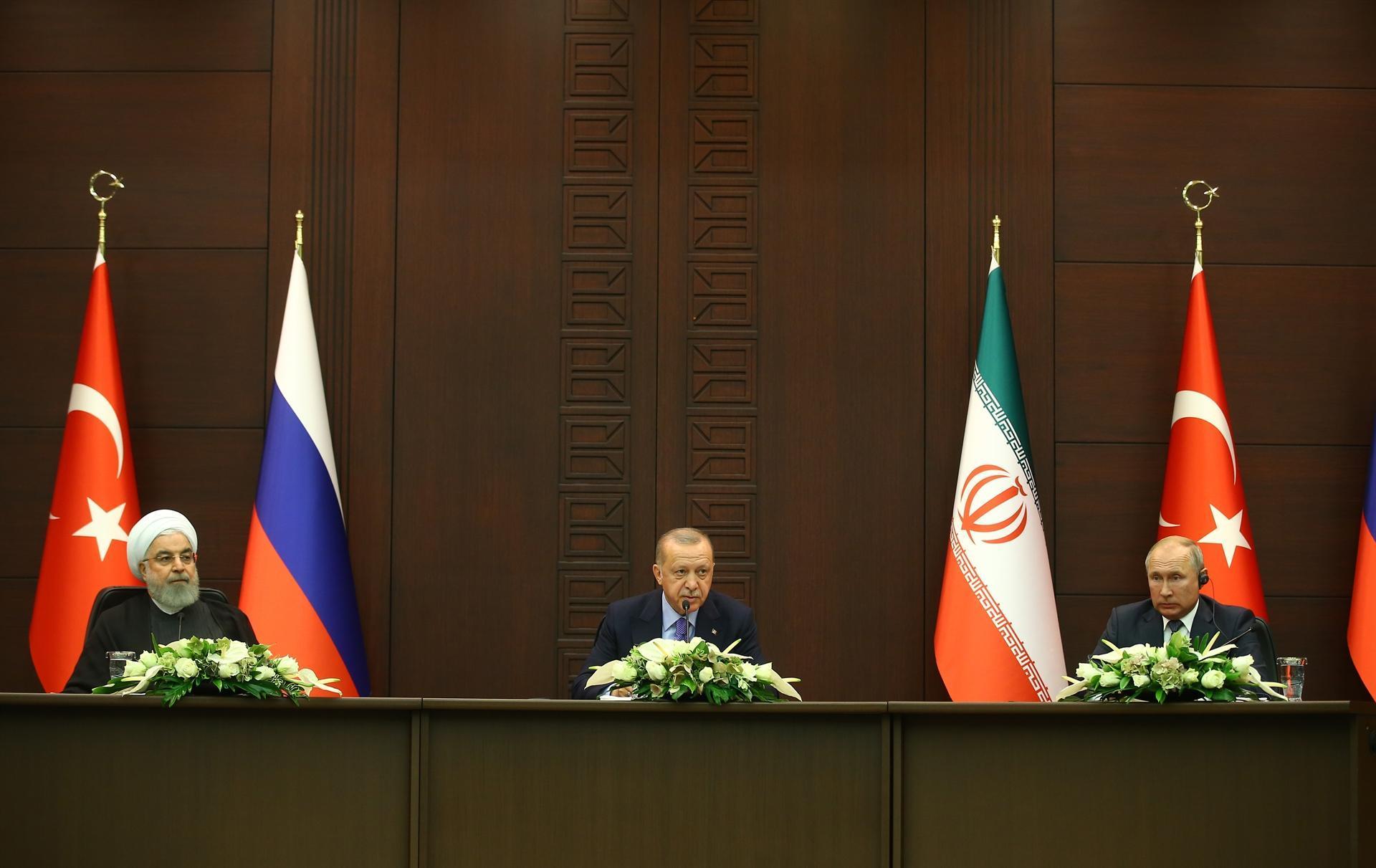
The Turkish, Iranian and Russian presidents on Sept. 16 reached agreement on the details of the to-be formed constitutional committee in Syria, during the fifth round of the trilateral Syria summit in the Turkish capital, aiming to secure peace in the war-torn country.
“During the summit, we made important decisions that will create hope for a political resolution in Syria. We have once more declared that all of us have the same sensitivity when it comes to the territorial integrity and political unity of Syria. We have underlined the unacceptance of giving support to terrorist organizations on the grounds of the fight against Daesh,” Turkish President Recep Tayyip Erdoğan said, using the Arabic acronym for ISIL, at the Çankaya Palace of Ankara.
The president’s remarks came during a press conference with his Iranian and Russian counterparts, which was followed by the tripartite meetings.
“We have displayed a constructive and flexible approach regarding the procedural rules and members of the constitutional committee. We have shown effort to advance the political process. Henceforth, problems about the establishment of the committee have been eliminated with our joint efforts,” Erdoğan said.
The formation of the constitutional committee is to be kicked off as soon as possible, in accordance with the United Nations, after the meetings, Erdoğan underlined.
Iran’s Hassan Rouhani echoed Erdoğan’s remarks on the constitutional committee, saying they hope work will start immediately.
“We hope that it will overhaul the constitution,” he said.
For his part, Russian President Vladimir Putin said the list for the committee has been approved, and the work should begin right away.
“As a result of this convention, the decision to form the constitutional committee has been made. The said committee should start work in Geneva as soon as possible,” Putin said.
Syria’s territorial integrity should be protected, the leaders say
All leaders also stressed protecting Syria’s territorial integrity and the fight against terrorist organizations in this sense, putting emphasis on the “concerning” situation in Idlib.
“This matter carries much importance both in Syria’s political unity and territorial integrity and the national security of Turkey,” Erdoğan said.
The threat of ISIL has been eliminated in the current situation yet the illegal PKK and its branch in Syria, YPG/PYG, poses a threat for the future of Syria, the president stressed.
Turkey has been conducting many operations, striking big blows to terrorist organizations with Operation Euphrates Shield and Operation Olive Branch, Erdoğan underlined.
Some 360,000 Syrians have returned to places in Syria, which Turkey had made secure thanks to its operations, he said.
Regardless, Turkey has been standing by displaced Syrians, even in the former’s troublesome times, he added.
“We have been hosting over 3.6 million Syrians in our lands, who have run away from oppression, terror and massacre,” he said.
“With the joint steps we took in Idlib, we have prevented a huge tragedy which could have played havoc with the lives of 4 million civilians,” Erdoğan added.
“We are all against foreign intervention in Syria,” said Iran’s Hassan Rouhani.
“The U.S., on the other hand, supported terrorists in Syria and tried to separate it. This is unacceptable,” Rouhani added.
Syria should be secure so that the country’s people can safely return to their homeland, he added.
“We should give support to the Syrian people, who have been going through very hard things,” the Iranian president said.
In the meantime, Russia’s Putin said the situation in the de-escalation zone of Idlib is “concerning.”
“Recently, the activities of extreme groups have been taking place [in the de-escalation zone]. This should not be a haven for terrorists. We need to take additional steps to fully eliminate the terrorist threat in here,” Putin said.
Turkey and Russia agreed in September 2018 to turn Idlib into a de-escalation zone where any act of aggression is prohibited. In the zone, both countries set up observation posts to monitor a ceasefire and withdrawal of terrorist organizations. Turkey has 12 posts with a sizeable deployment in the region.
The Bashar al-Assad regime in Syria and its allies have been accused of consistently breaking the terms of the ceasefire as attacks inside the de-escalation zone have been launched frequently.
The de-escalation zone is currently inhabited by some 4 million civilians, including hundreds of thousands of people displaced in recent years by regime forces from cities and towns throughout the war-torn country.
The leaders also condemned the U.S. decision to recognize Syria’s occupied Golan Heights as Israeli territory, which in addition to violating international law, also threatens regional peace and security, according to a joint statement.